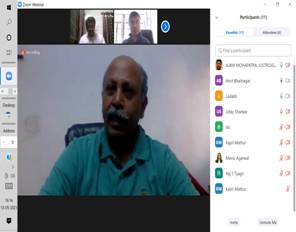In its series of State Level webinars that TRIFED conducted recently to review the progress of the implementation of the Van Dhan Yojana, one important outreach session was with the state teams and VDVKs of the Union Territory of Ladakh. The main focus of the session was to plan the operationalization of the sanctioned VDVKs and VDVKCs. Attendees from the UT (SIAs, SNAs, VDVKCs) were keyed up and geared to operationalize the currently sanctioned 10 VDVK cluster in the Union Territory with utmost urgency. NRLM is the implementing agency for the UT of Ladakh.
The webinar was initiated to reiterate the need and importance of implementation of MSP For MFP Scheme, Van Dhan Yojana and other convergence projects which aid in employment and income generation for the tribal people, while keeping in mind and implementing complete safety measures during these times of the pandemic.
The webinar started with a progress update on the status of implementation of the MSP for MFP Scheme and Van Dhan Yojana by the regional manager of the region. It was informed that progress of implementation of Van Dhan Vikas Kendras and VDVKCs had not picked up as the State Implementing Agencies have a shortage of manpower. However, survey work of 5 VDVKCs had been completed. It was agreed to have follow-up meetings at regular intervals.

Based on the discussion, it was also agreed to formulate and implement the five-step plan for each VDVKC. Step 1 of the five-step plan involves the identification of items for Procurement of MFPS in each VDVKC and strengthening it with a planned development of infrastructure including Procurement Sheds and godowns. Step 2 entails the appointment of Local NGOs or NRLM Officials as Mentors for each Cluster as per guidelines issued and Release of money to each Cluster by Transferring Rs 10 lacs to each cluster account. Step 3 will require the preparation of a Business Plan for each cluster for taking up Value addition and other formalities including opening of bank account and setting up of signages and Boards for identification of each VDVK Cluster and VDVK. Step 4 envisages the Planning and facilitating of each Cluster into Production, Branding, Packaging and Sale of its selected products as per the Business Plan. And in Step 5, ESDP, SFURTI and TRIFOOD schemes will be converged with respective clusters gradually to expand the scope of programme.
The rest of the webinar was focused on the clarification of any related queries from either the UT teams or the representatives of the Van Dhan Vikas Kendras or clusters.
A series of Webinars with Top Officials of the partner states across the country has taken place from May 10-May 28,2021.
The Mechanism for Marketing of Minor Forest Produce (MFP) and its component, Van Dhan tribal start-ups is an initiative implemented by TRIFED towards income and livelihood generation of the tribal population. The MSP For MFP Scheme aims to provide remunerative and fair prices to tribal gatherers of forest produces, almost three times higher than would be available to them from middle men, trebling their incomes.
The Van Dhan tribal start-ups is a programme for value addition, branding & marketing of Minor Forest Produces by establishing Van Dhan Kendras to facilitate creation of sustainable livelihoods for the forest-based tribes. A typical Van Dhan Vikas Kendra includes 20 tribal members. 15 such Van Dhan Vikas Kendras form 1 Van Dhan Vikas Kendra cluster. The Van Dhan Vikas Kendra Clusters (VDVKCs) provide Van Dhan Vikas Kendras economies of scale, livelihood and market-linkages, as well as entrepreneurship opportunities.
To continue with the progress made in the implementation and take it to the next level, the convergence of the Van Dhan Yojana with the MSP for MFP has been planned through the convergence of the Van Dhan Yojana to the Enterprise Model: from processing to cluster development under SFURTI (Scheme of Fund for Regeneration of Traditional Industries) and TRIFOOD.
The webinars provided an opportunity to the State implementing agencies and the other stakeholders to connect, review and correct course of action so that maximum benefit that can be derived by the efficient implementation of these schemes accrue to the tribal population.
With the successful implementation of these planned initiatives, TRIFED is working towards the transformation of the tribal ecosystem.

 हिंदी
हिंदी






